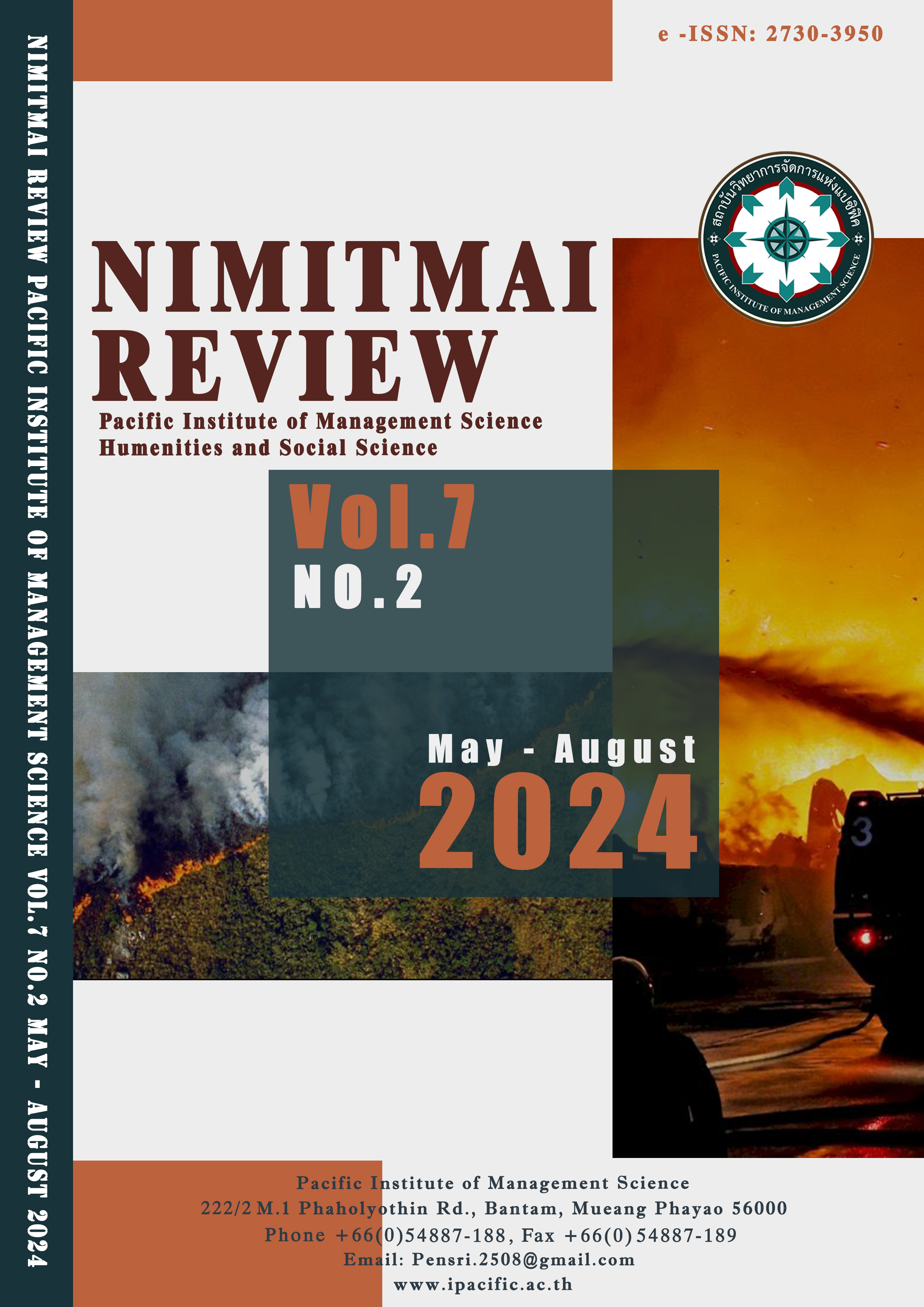A study on the Impact of Big DATA on Education Management in Chinese Universities and Countermeasures
คำสำคัญ:
Keywords: business school, big data, education management, shadow, countermeasuresบทคัดย่อ
Big data is significantly impacting all aspects of human society, leading to a transformation in people's cognitive, operational, and lifestyle patterns. Furthermore, it alters the productivity and production relationships within society and is considered a valuable asset for the future, comparable to "new oil," "new gold mine," "new resources," and an "innovation engine." It is considered a very valuable asset for the future, comparable to "new oil,” “new gold mine," "new resources," and a "new engine" for innovation. Since 2012, the United States, the United Kingdom, France, Japan, South Korea, and other developed nations have prioritized big data as a key component of their national strategies. In 2015, China explicitly stated its objective of "implementing the national big data strategy" during the Fifth Plenary Session of the 18th CPC Central Committee. To address the challenges posed by the era of big data, the government must collaborate closely with corporations, universities, and research organizations and harness society's collective strength to actively participate. In and universities will play a significant role and exert influence in this current era of big data. Despite the numerous challenges faced by China's education big data sector, university big data research possesses distinct advantages, making the future of big data research and application in education administration highly promising. Management is a form of productivity that can be more crucial than other elements in certain situations. The integration of big data into education management indicates a significant advancement in the field of education management in colleges and universities. Utilizing big data enables us to forecast trends, extract value, and encourage colleges and universities to generate new knowledge more intelligently. In contrast to big data applications in the business sector, big data in universities primarily emphasizes the exploration of correlations and the subsequent identification of causal linkages.
เอกสารอ้างอิง
Ahmed, E. (2019). Big data analytics in Internet of Things: A comprehensive review. Journal of Computer Networks, 135, 459-471. doi:10.1016/j.comnet.2019.06.013
Ahuja, S. P. (2020). Building a big data analytics culture in academic institutions. Journal of Computer Information Systems, 60(1), 57-65. doi:10.1080/08874417.2018.1543001
Alharthi, A. (2018). Cloud services adoption in higher education: Challenges and solutions. Journal of Cloud Computing, 7, 20. doi:10.1186/s13677-018-0093-0
Allen, L. K. (2017). Learning analytics: Considerations for educators. TechTrends, 61(3), 272-280. doi:10.1007/s11528-017-0170-4
Asif, M. (2018). Educational data mining: Analyzing student performance. Computers & Education, 115, 177-194. doi:10.1016/j.compedu.2018.05.007
Allen, L. K., Perret, P., & Wiebe, E. N. (2017). Considering critical issues in learning analytics. TechTrends, 61(3), 272-280. doi:10.1007/s11528-017-0170-4
Asif, M., Merceron, A., Ali, S. A., & Haider, N. G. (2017). Analyzing undergraduate students' performance using educational data mining. Computers & Education, 113, 177-194. doi: 10.1016/j.compedu.2017.05.007
Benita, F., & Bignami, F. (2020). The digital revolution and higher education: Perspectives from the sociology of technology. Studies in Higher Education, 45(5), 921-934. doi:10.1080/03075079.2019.1572755
Benita, F. (2020). The digital revolution in higher education: Sociological perspectives. Studies in Higher Education, 45(5), 921-934. doi:10.1080/03075079.2019.1572755
Daniel, B. K. (2019). Learning analytics in higher education: Current theory and practice. Journal of Learning Analytics, 5(1), 25-43. doi:10.18608/jla.2019.51.3
Dawson, S. (2018). An epistemological journey through big data and learning analytics. Journal of Learning Analytics, 6(3), 1-25. doi:10.18608/jla.2018.63.1
Dev, S. (2019). Inclusive education through data analytics: A case study. Information Technology & People, 32(3), 588-608. doi:10.1108/ITP-02-2018-0075
Dietrich, T. (2020). Evaluating the impact of big data analytics on student retention. Journal of Marketing for Higher Education, 30(2), 248-263. doi:10.1080/08841241.2020.1652 544
Daniel, B. K. (2017). Big data and learning analytics in higher education: Current theory and practice. Journal of Learning Analytics, 4(1), 25-43. doi:10.18608/jla.2017.41.3
Dawson, S., Joksimović, S., Poquet, O., & Siemens, G. (2019). Big data and learning analytics: An epistemological journey. Analytics and Technology in the Future of Higher Education, 23, 1-25. doi:10.1007/978-3-030-19918-3_1
Dev, S., Shroff, G., & Gulati, R. (2019). Data analytics for inclusive education: A case study in India. Information Technology & People, 32(3), 588-608. doi:10.1108/ITP-02-2018-0075
Dietrich, T., Albrecht, T., & Susnjak, T. (2019). Evaluating the impact of big data analytics on retention in higher education. Journal of Marketing for Higher Education, 29(2), 248-263. doi:10.1080/08841241.2019.1652544
Ferguson, R. (2019). The state of learning analytics in 2019: A review and future challenges. Journal of Learning Analytics, 6(3), 1-10. doi:10.18608/jla.2019.63.1
Gibson, P., & Ifenthaler, D. (2017). Moving beyond learning analytics: The rise of ethical big data. Educational Technology & Society, 20(1), 14-26. doi:10.2307/26229201
Mah, D. K., & Ifenthaler, D. (2018). Utilizing learning analytics to support study success: A systematic review. Educational Technology Research and Development, 66(1), 61-82. doi:10.1007/s11423-017-9533-1
Miller, R., & Pérez-Luño, A. (2018). Opening the black box of learning analytics: Predicting students’ success using learning management systems data. Computers & Education, 113, 119-129. doi:10.1016/j.compedu.2017.05.008
Pradeep, S., & Narasimhan, V. (2017). Big data in higher education: A review of literature. Journal of Computer Science, 13(10), 693-702. doi:10.3844/jcssp.2017.693.702
Siemens, G., & Long, P. (2011). Penetrating the fog: Analytics in learning and education. EDUCAUSE Review, 46(5), 30-32. doi:10.7916/D8MG7MVG
Slade, S., & Prinsloo, P. (2013). Learning analytics: Ethical issues and dilemmas. American Behavioral Scientist, 57(10), 1510-1529. doi:10.1177/0002764213479366
ดาวน์โหลด
เผยแพร่แล้ว
รูปแบบการอ้างอิง
ฉบับ
ประเภทบทความ
สัญญาอนุญาต
ลิขสิทธิ์ (c) 2024 Nimitmai Review Journal

อนุญาตภายใต้เงื่อนไข Creative Commons Attribution-NonCommercial-NoDerivatives 4.0 International License.



